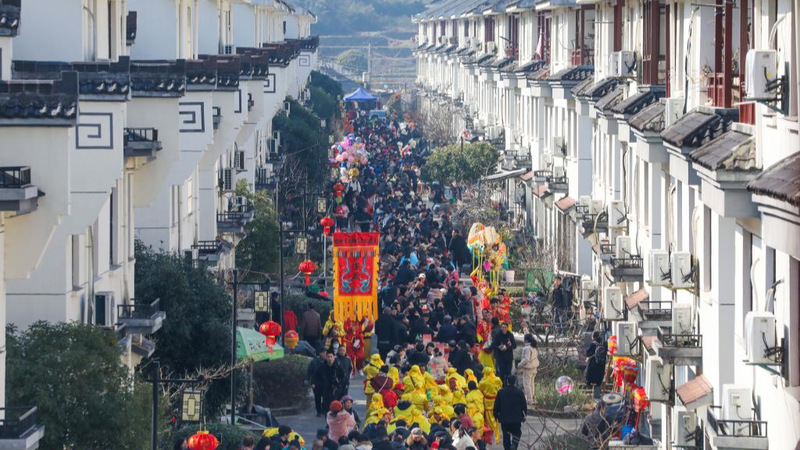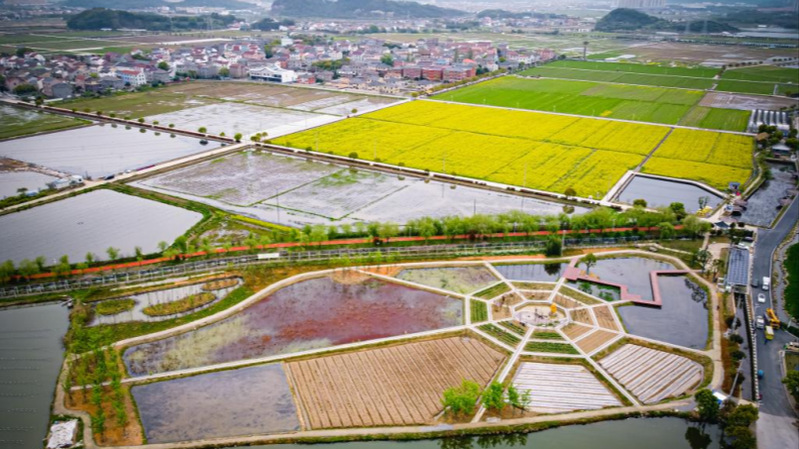China's No. 1 central document highlights rural revitalization
Opinion19:05, 05-Feb-2024
Zheng Linyi , Ji Chen

People take part in an open-air banquet during a Chinese New Year culture festival in Lianhua Town in Jiande City, east China's Zhejiang Province, January 28, 2024. /Xinhua
Editor's note: Zheng Linyi, a special commentator on current affairs for CGTN, is an associate research fellow at the China Academy for Rural Development (CARD), School of Public Affairs, Zhejiang University. Ji Chen, a special commentator for CGTN, is an associate professor at the China Academy for Rural Development (CARD), School of Public Affairs, Zhejiang University. The article reflects the authors' opinions and not necessarily the views of CGTN.
On February 3, 2024, the Central Committee of the Communist Party and the State Council of China jointly issued the Opinions on Learning and Applying the Experience of the Thousand Villages Demonstration and Ten Thousand Villages Renovation Project to Effectively Promote the Comprehensive Revitalization of Rural Areas. This is the 21st No. 1 central document of China which has been guiding the overall work on agriculture and rural development since the turn of the century, reflecting the continuous and consistent focus of the central government on rural revitalization.
What has been particularly addressed this year is that for the first time, the Thousand Villages Demonstration and Ten Thousand Villages Renovation (from now on referred to as the Project), as a typical case, has been written into the No.1 central document. Although there were many local reform experience examples written into the previous No.1 central documents, it is the first time that the Project from the Zhejiang experience has been fully reflected in the title of No.1 central document. Why is it so special and what are its key values?
The Project is a major decision planned, deployed, and promoted by Xi Jinping, general secretary of the Communist Party of China (CPC) Central Committee, during his tenure (2002-2007) in Zhejiang Province as secretary of CPC Zhejiang Provincial Committee, which focused on improving agricultural production, farmers' well-being and the rural environment. About 10,000 of the nearly 40,000 villages in Zhejiang Province were selected for comprehensive rural improvement, and about 1,000 central villages were developed into well-off demonstration villages.
Over the past 20 years, Zhejiang Province has consistently implemented the Project, achieving a series of remarkable results. The disposable income per capita of rural residents in Zhejiang Province has increased from 5,431 yuan ($754) in 2003 to 40,311 yuan ($5,600) in 2023, which is ahead of other provinces in China. The urban-rural income ratio has also narrowed from 2.43 in 2003 to 1.86 in 2023, indicating the lowest level of urban-rural disparity among all provinces in China. In recognition of the significance of the Project, the United Nations also honored Zhejiang Province with its highest environmental accolade, the Champions of the Earth Award, in September 2018.
How has the Project achieved such remarkable results? What experiences are there worth learning across the country?
Firstly, strong leadership and full support count the most. Zhejiang has established a progressing mechanism with the top leaders of the Communist Party and government supervising the Project. Targeting funds, municipal financial subsidies, as well as county-level financial budgets have been provided. Summit conferences are held annually to carry out the Project with the participation of provincial Party leaders and government officials. Meanwhile, regular recognition is given to outstanding collectives and individuals involved in the Project to create a strong atmosphere of learning, catching up, and striving for improvement and excellence.

An agricultural study tour base in Fengqiao Town in Zhuji, east China's Zhejiang Province, March 29, 2023. /Xinhua
Additionally, the Zhejiang government always considers issues from the perspective of the rural population, and it actively promotes grassroots governance mechanisms such as the local people's council, ethical evaluation group, and services group. It also establishes incentive mechanisms to encourage rural people to actively participate in public affairs.
Furthermore, Zhejiang Province has launched a detailed roadmap to achieve the planned progress. Local government starts with cost-effective projects such as centralized rural waste treatment and village environmental clean-up. It then advances to improve water and sanitation facilities, road construction, greening, and lighting. It further promotes industrial development, improves public services and embraces digitalization, following a successive approach to ensure that rural living environments are in harmony with local economic development.
Moreover, Zhejiang has implemented tailored approaches for diversified development. It takes account of the significant regional differences in rural areas, including uneven economic and social development and disparities in project implementation progress. It follows the development pattern of each village and combines local development levels, fiscal capacity, and farmers' acceptance levels to promote the construction of thousands of distinctive and livable rural areas.
Apart from that, clean waters and green mountains are just as valuable as gold and silver. Zhejiang adheres to the development concept and closely integrates village renovation with green environment construction. These efforts have contributed to increasing farmers' incomes and improving their living standards, which at the same time have promoted farmers' happiness and the construction of beautiful villages.
Last but not least, over the past two decades, Zhejiang has always regarded the Project as a priority task and has persisted in completing it. Zhejiang remained committed to the Project's goals and it avoided pursuing short-term achievements or vanity projects.
A single flower does not make spring, while one hundred flowers in full blossom bring spring to the garden. On the occasion of the Chinese New Year, let us learn and apply the experience of the Project as a guide for achieving the comprehensive revitalization of rural areas, for gaining a beautiful livable and workable rural environment, and finally promote China's modernization through accelerating the modernization of agricultural and rural areas.
乡村振兴培训、社会治理培训、城市管理培训、履职能力培训、应急管理培训、社会保障系统培训、高校培训、两新培训、生态文明培训、市场监督培训、纪检监察培训、农业农村培训、创新创业培训、非公企业、高校改革培训、三农培训、自然资源培训、县域经济培训、国土培训、长三角一体化、城乡协调发展、碳达峰碳中和、大数据、民营经济培训、医保培训、社保培训、国土空间培训、军人事务培训、能源培训等。
涉及培训系统有:
司法系统、教育系统、公安系统、财政系统、检察院、档案系统、工商联、卫健委、宣传系统、城管局、审计系统、档案系统、民宗委、人社局、管委会、编办系统、协会、网信办、文广旅游局、住建系统、卫健系统、医疗系统、金融系统、银行系统培训、城市管理、财税系统、地铁系统、电力系统等。



